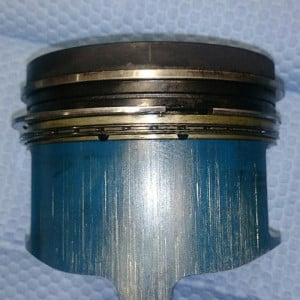To fix washed out cylinders, change the oil, remove the plugs, fuel pump, and coil fuses, and crank the motor to remove excess gas. Squirt a shot of motor oil into each cylinder, reinstall the plugs, and crank again.
If you’re experiencing washed out cylinders, it’s important to address the issue promptly to prevent further damage to your engine. Cylinder wash, also known as fuel wash, occurs when the protective layer of oil on the cylinder walls is washed away, leaving them susceptible to damage.
This can lead to engine failure if not resolved. Symptoms of washed cylinder walls include decreased compression and poor engine performance. We will discuss how to effectively fix washed out cylinders and restore your engine’s performance.

Credit: www.amazon.com
Understanding Cylinder Wash
Understanding cylinder wash is crucial in fixing washed out cylinders. Cylinder wash, also known as fuel wash, occurs when the protective layer of oil on the cylinder walls gets washed off, leaving them susceptible to damage. This can happen when raw fuel comes into contact with the cylinder walls. Common causes of cylinder wash include leaking fuel injectors and vacuum leaks. The symptoms of cylinder wash include decreased engine performance and compression, increased oil consumption, and rough idling. To fix washed out cylinders, it is recommended to change the oil, remove all the plugs, remove the fuel pump and coil fuses, and crank the motor to blow out all the gas. Adding a shot of motor oil into each cylinder and reinstalling the plugs can help restore compression. It is important to address cylinder wash promptly to prevent further damage to your engine.
Fixing Washed Out Cylinders
Fixing washed out cylinders is essential to ensure proper engine performance and prevent further damage. One of the first steps in addressing this issue is to change the oil. This helps remove any contaminated oil that may have contributed to the cylinder wash. Additionally, it is important to remove all the plugs and fuel pump to allow for complete cleaning of the cylinders.
Restoring compression on cylinder walls is crucial to ensure optimal engine function. This can be achieved by cranking the motor and blowing out any remaining fuel. Adding a shot of motor oil into each cylinder helps protect and lubricate the walls. Finally, reinstalling the plugs and cranking the engine will help restore compression.
Preventing Cylinder Wash
Preventing Cylinder Wash is essential to ensuring the longevity and efficiency of your engine. One of the main culprits behind cylinder wash is Leaking Fuel Injectors. When fuel injectors leak, raw fuel can wash off the protective coat on the cylinder walls, leading to damage. Regular maintenance and inspection of fuel injectors can help identify and fix any leaks before they cause extensive damage.
Another factor to consider is Vacuum Leaks. Vacuum leaks can disrupt the air-fuel mixture and create an imbalance in the combustion process, leading to cylinder wash. It is crucial to check for and repair any vacuum leaks to prevent washout.
Proper lubrication is also of utmost importance in preventing cylinder wash. Friction between the piston and cylinder walls can accelerate wear and tear, leading to washout. Choose the right lubricant and ensure adequate lubrication film thickness to minimize friction and protect the cylinder walls.

Credit: dfcdiesel.com

Credit: www.amazon.com
Frequently Asked Questions Of How To Fix Washed Out Cylinders
How Do You Fix Cylinder Wash?
To fix cylinder wash, change the oil, remove plugs and fuel pump/coil fuses, then crank the motor to blow out excess gas. Add a shot of motor oil to each cylinder, reinstall the plugs, and crank the engine.
What Happens When A Cylinder Washes Out?
When a cylinder washes out, the protective layer of oil on the cylinder walls is washed off, making them susceptible to damage. This can be caused by raw fuel washing off the oil layer. To fix it, change the oil, remove all plugs, and crank the engine to remove any remaining gas.
Then, squirt motor oil into each cylinder, reinstall the plugs, and crank the engine.
What Is The Best Thing To Clean Cylinder Walls With?
To clean cylinder walls, use a shot of motor oil in each cylinder, then crank the motor. This helps remove any gas and protect the walls from damage.
What Causes Cylinders To Wear?
Cylinders wear due to friction and inadequate lubrication. The piston’s motion against the cylinder walls creates friction, which gradually wears down the surfaces. Insufficient lubrication or using the wrong lubricant worsens the friction, leading to accelerated wear.
Conclusion
To fix washed-out cylinders, it is crucial to take immediate action. Start by changing the oil, removing all the plugs, and eliminating fuel pump and coil fuses. Blow out as much gas as possible and apply a shot of motor oil to each cylinder.
Reinstall the plugs and crank the motor. By following these steps, you can restore the protective layer of oil on the cylinder walls and prevent further damage. Taking prompt action is key to maintaining the integrity and performance of your engine.






